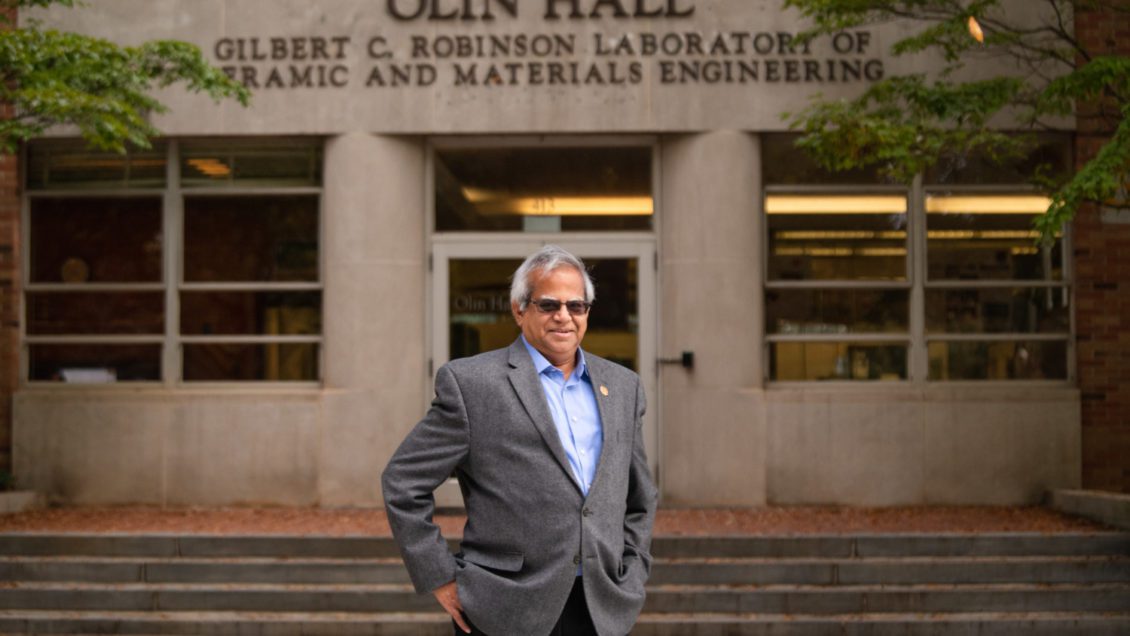CLEMSON — The founder of Waccamaw Clay Products and Waccamaw Pottery joined with his associates 30 years ago to help Clemson University attract and retain some of the nation’s best engineering professors, and their gift is continuing to pay dividends.
The late George J. Bishop III and his associates provided the funds in 1989 to establish an endowed chair, an esteemed faculty position that comes with funds for education and research.

Various professors have held the endowed chair over the years, and now a new one has been appointed to the position. Rajendra Bordia is the new George J. Bishop, III Endowed Chair in Ceramic and Materials Engineering.
Bordia is a Clemson professor and scientific director of MADE in SC, a statewide program focused on growing research, education and workforce in advanced materials. He previously served a six-year term as chair of Clemson’s department of materials science and engineering.
Endowed chairs are awarded to faculty members who are accomplished in research and teaching, and the honor is widely regarded as a vote of confidence that they will continue to perform at a high level.
“It’s an honor to hold the George J. Bishop, III Endowed Chair in Ceramic and Materials Engineering,” Bordia said. “The position will provide new opportunities for my students and help us further the field of advanced materials.”
Bishop graduated from Clemson in 1952 with a ceramic engineering degree and worked in Columbia for several years before moving his family to Myrtle Beach in 1965. Bishop founded Waccamaw Clay Products, producing beautiful earth-tone bricks.
Bishop worked with Clemson ceramic engineer Gil Robinson to develop the brick, which can still be seen on buildings in the Myrtle Beach area and across the Southeast.
In 1977, Bishop founded Waccamaw Pottery, a home décor and furnishings store in Myrtle Beach. Its first store drew millions of shoppers each year, even though it was about three miles from the throngs of tourists at the beach.

The company later expanded, opening 15 in locations across South and North Carolina, Florida, Alabama, Illinois and Virginia, to name a few.
Bishop shared the fruits of his success, leaving his mark at Clemson and across South Carolina.
A program that brings some of the nation’s top professors to Clemson for guest lectures is named for Bishop and his late wife, Dot.
Clemson in 1992 awarded him the Thomas Green Clemson Medallion, the highest public honor conferred by the University.
Kyle Brinkman, chair of Clemson’s materials science and engineering, said Bordia is highly deserving of the endowed chair.
“Dr. Bordia has made impactful contributions to the fundamental aspects of ceramic science, including the processing of ceramics and microstructure development,” Brinkman said. “He is a well-respected scholar and educator and I offer him my most sincere congratulations.”
Bordia stepped down as department chair earlier this year to devote himself to MADE in SC, a program that is funded with $20 million from the National Science Foundation’s Established Program to Stimulate Competitive Research. The program brings together 69 participants from 10 of the state’s higher-education institutions.
MADE in SC has three thrusts: optical, electrochemical and magnetic materials; stimuli-responsive polymeric materials; and interactive biomaterials.
“I’m really getting to learn the overall scene of materials research in South Carolina,” Bordia said. “As part of it, I’m developing some good contacts with people. That part is very exciting.”
The contacts could lead to new programs, such as one that would bring several new Ph.D. students to Clemson, he said.
Bordia is also involved with creating new materials for extreme environments, such as the high temperatures inside gas turbines. He and several others from Clemson have formed a core group that has established leadership in the field.
Bordia said he will use the funds that come with the endowed chair to look for ways to strategically expand his research portfolio or get into new areas of research. He plans to travel to research centers around the world to establish new connections and sponsor a short-term visit by a colleague who can share his or her knowledge with students and faculty.
Before arriving at Clemson, Bordia served as chair of the department of materials science and engineering at the University of Washington. He also worked as a research scientist at DuPont.
Bordia is a Fellow of the American Ceramic Society. His honors also include winning Outstanding Educator of the Year Award from the American Ceramic Society and being elected academician by the World Academy of Ceramics.
Anand Gramopadhye, dean of the College of Engineering, Computing and Applied Sciences, congratulated Bordia on being named George J. Bishop, III Chair in Ceramic and Materials Engineering.
“Dr. Bordia has demonstrated leadership at Clemson and in his field of research,” Gramopadhye said. “His contributions illustrate the best of our college’s mission to create graduates who can be productive in South Carolina and around the world. This is a richly deserved honor.”
Get in touch and we will connect you with the author or another expert.
Or email us at news@clemson.edu

